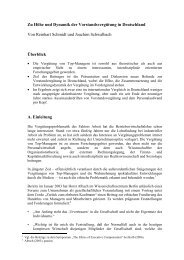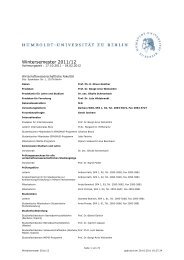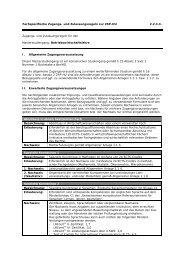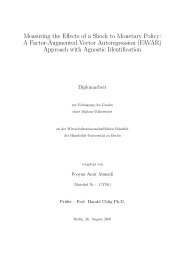Kommentiertes Vorlesungsverzeichnis WS 2012/13
Kommentiertes Vorlesungsverzeichnis WS 2012/13
Kommentiertes Vorlesungsverzeichnis WS 2012/13
Sie wollen auch ein ePaper? Erhöhen Sie die Reichweite Ihrer Titel.
YUMPU macht aus Druck-PDFs automatisch weboptimierte ePaper, die Google liebt.
MA BWL: 6 SP, Modul: "Methodological Skills" oder "Introduction to Advanced Macroeconomic Analysis"<br />
MA Wirtschaftsinformatik: 6 SP, Modul: "Introduction to Advanced Macroeconomic Analysis"<br />
Diplom: 4 KP, Wirtschaftstheorie (wurde ab <strong>WS</strong> <strong>2012</strong>/<strong>13</strong> in den Pool der Pflichtlehrveranstaltungen Wirtschaftstheorie als<br />
Alternative zu "Konjunktur und Beschäftigungstheorie" aufgenommen)<br />
Prüfung:<br />
Klausur (90 min)<br />
70 942 Advanced Macroeconomic Analysis I (englisch)<br />
4 S<strong>WS</strong><br />
VL Mi 08:30-12:00 wöch. (1) M. Burda,<br />
L. Weinke<br />
1) Die Veranstaltung findet am DIW, Mohrenstraße 58 statt, Schumpeter-Hörsaal.<br />
The objective of this lecture is to enable M.A. and Ph.D. students to use macroeconomic concepts for their own research. This<br />
leads to a higher level of formalization in this lecture than in the introductory lecture (IAMA).<br />
Contents (Prof. Burda): Methods of modern macroeconomics for researchers in the field. Stationary Markov environments,<br />
state-space methods, stochastic difference equations. Dynamic programming and Lagrangian methods, Complete markets,<br />
Dynamic stochastic general equilibrium models, Solution techniques. Empirical consequences of macroeconomic shocks; structural<br />
estimation, the Ramsey problem.<br />
Contents (Prof. Weinke): This course develops dynamic stochastic general equilibrium (DSGE) models and uses them for positive<br />
and normative macroeconomic analysis. To this end a number of theoretical and empirical concepts are presented. Examples<br />
include the computation of impulse response functions, structural vector autoregressions, as well as an introduction to structural<br />
estimation. On the normative side the concept of Ramsey optimal policy is presented.<br />
Literatur:<br />
Reference list (Prof. Burda): Ljungqvist and Sargent, Recursive Macroeconomics , 2 nd edition (Cambridge, USA: 2004); selected<br />
journal articles<br />
Reference list (Prof. Weinke): We will use chapters 8 and 15 of Ljungqvist and Sargent, Recursive Macroeconomics , 2 nd edition<br />
(Cambridge, USA: 2004), as well as selected articles, e.g., Galí, Jordi and Pau Rabanal (2004), Technology Shocks and Aggregate<br />
Fluctuations: How Well Does the RBC Model Fit Postwar U.S. Data?, in: NBER Macroeconomics Annual.<br />
Any further documents needed for the lecture will be available on moodle.<br />
Organisatorisches:<br />
MA VWL, MEMS: 6 SP, Modul: "Advanced Macroeconomic Analysis" (In dieses Modul ist entweder “Introduction to Advanced<br />
Macroeconomic Analysis“ oder“Advanced Macroeconomic Analysis I (Ph.D-Level)“ einzubringen.)<br />
MA BWL, MA Wirtschaftsinformatik: 6 SP, Modul: "Advanced Macroeconomic Analysis I"<br />
Diplom: 4 KP, Wirtschaftstheorie<br />
Prüfung:<br />
Klausur (90 min)<br />
70 953 Empirical Labor Economics (englisch)<br />
4 S<strong>WS</strong><br />
VL/UE Mo 14-18 wöch. SPA 1, 22 R. Freier<br />
This course provides an overview on the economic analysis of labor markets. The emphasis is on applied microeconomics and<br />
empirical analysis. Topics to be covered include: labor supply and demand, human capital, education and training, changes in<br />
the wages structure and inequality, biased technological change and returns to skills, organizational change and skill demand,<br />
the closing gender gap. The introduction of topics will be on textbook level, but the focus will be on the discussion of empirical<br />
implementation strategies used in recent publications.<br />
Acquaintance of intermediate microeconomics or labor economics (ideally Prof. Burda’s course in labor economics) and<br />
econometrics is highly recommended.<br />
Literatur:<br />
R. Ehrenberg and R. Smith, 2003, Modern Labor Economics;<br />
P. Cahuc and A. Zylberberg, 2004, Labor Economics;<br />
+ selected journal articles<br />
Organisatorisches:<br />
MA: 6 SP, Modul: "Labor Markets and Social Policy"<br />
Diplom: 4 KP, Wirtschaftstheorie oder Wirtschaftspolitik<br />
Prüfung:<br />
Klausur (90 min)<br />
70 957 Topics in Labor Economics (englisch)<br />
2 S<strong>WS</strong><br />
SE Di 08-10 wöch. SPA 1, 23 R. Freier<br />
The seminar aims at preparing students to conduct, present and discuss critically empirical research in all areas of labor economics.<br />
It may likewise be viewed as a preparation for an empirical diploma, master or doctoral thesis. Students are free to choose a topic<br />
themselves or to work on a topic proposed by the instructor. The topic is expected to be in the field labor economics. Participants are<br />
expected to perform an empirical analysis, discuss the relevant literature, data sources, methodology and to acquaint themselves<br />
with the necessary institutional details and to present and discuss their work.<br />
Literatur:<br />
Selected journal articles<br />
Organisatorisches:<br />
Seite 59 von 82<br />
Wintersemester <strong>2012</strong>/<strong>13</strong> gedruckt am 16.11.<strong>2012</strong> 08:15:03


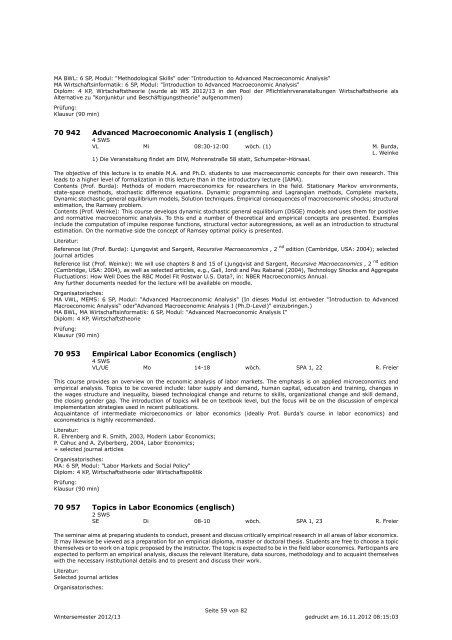
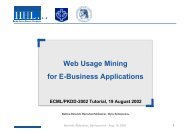
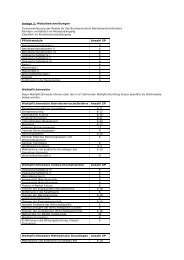

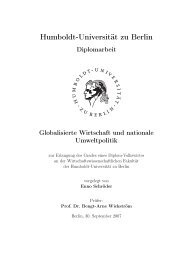
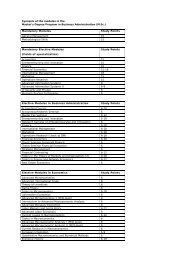
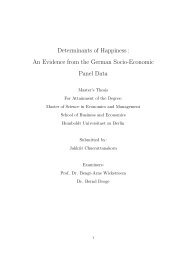
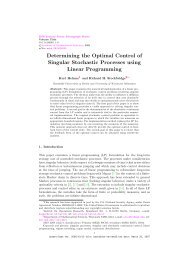
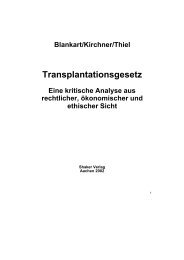
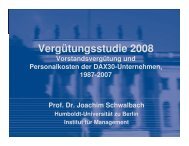
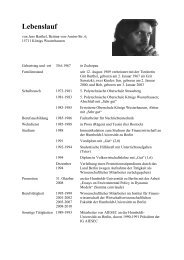
![[Text eingeben] [Text eingeben] Lebenslauf Anna-Maria Schneider](https://img.yumpu.com/16300391/1/184x260/text-eingeben-text-eingeben-lebenslauf-anna-maria-schneider.jpg?quality=85)
